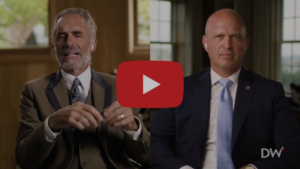We don’t always agree with our friends at Heritage and, but this is a fascinating discussion between Kevin Roberts and Jordan Peterson on recovering civil discourse in America and listening to the other side’s arguments.
Jordan Peterson: Do you really have to engage in contentious disagreement at the academic level if you’re a thinker? Why can’t everyone just get along? …
Kevin Roberts: Well, the intellectual combat is essential at the university level… and in American institutions, especially since the 1940s and accelerating in the 70s, there’s basically the absence of that. In fact, the opposite of that. So that if you go in and you say that I want to do intellectual combat, you’re committing some grave sin inside the American academy. But it’s essential because that’s where we refine our own positions…
Kevin Roberts: The think tank at its at its height, I would argue, is one where, of course, it’s going to have a particular set of positions that it’s taking publicly, but the process of arriving at those positions internally is one where there is, as I like to call it here at the Heritage Foundation, creative conflict.
Kevin Roberts: And in my nearly two years here, And almost every meeting that I have with our policy people, I asked them, well, what would the competing the alternative position be? And what case would we make for that? What evidence would we marshal for that? Because first of all, we need to question our assumptions… why it is that on the political left, there is this absence of that kind of conflict?
Kevin Roberts: I think it’s because, ultimately, The most radical part of leftism is one that undermines truth very actively. They’ve, they’ve sort of lost, as, as Yeats would say in his famous poem, they’ve, they’ve lost the center. There, there’s nothing cohering their mode of thought. And if you look at what’s going on in the political right, something that you’ve been talking about and researching more in recent years, there’s a very healthy, sometimes kind of fractious debate that’s going on… about particular policies, about the relationship between the individual and the state. Those can be a little frustrating sometimes in terms of political outcomes, but on the intellectual level, they are important and they speak to the vitality, the intellectual vitality of the political right.

